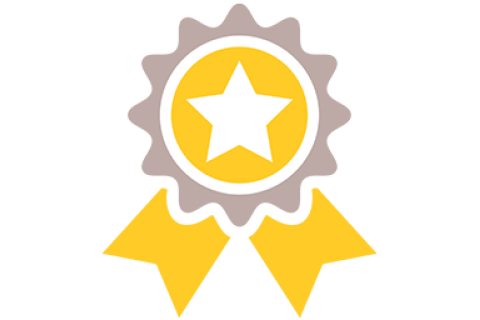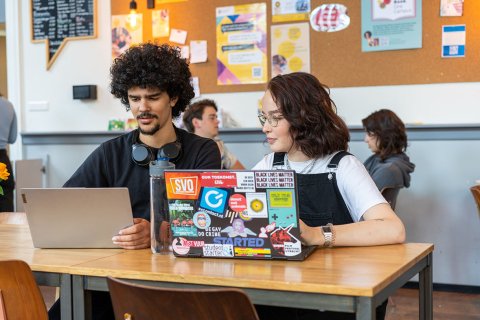Study programme
The research Master's programme Comparative Literary Studies is a two-year programme (120 EC). Each year is divided into two semesters, running from September until January and from February until June. A semester is divided into two study periods.
Curriculum
The programme consists of core courses, electives (including a possible internship or semester abroad), and a Master's thesis. Check the study schedule (PDF).
This is a demanding, reading-intensive programme. You should expect to be reading several hundred pages of primary (literary) and secondary (theoretical) materials per week. You should also expect to be doing quite a lot of writing, both in the form of short assignments and responses, as well as substantial research essays.
Core courses
All core courses are designed to develop an awareness of current debates within literary studies and knowledge of the most important theories and methodologies. You will practice formulating research questions and conducting original research. Through these activities, you will develop skills in the collection, selection and interpretation of sources, as well as writing, presenting and editing results to a professional academic standard.
Electives
Electives allow you to specialise in particular topics and develop an individual profile. You may also choose to concentrate on the literature of a specific language area (English, French, German, Italian, Spanish).
Read more
CLS students may choose up to 35 EC from the following options:
- Aesthetics of the Posthuman: module offered annually by CLS staff (in semester 2)
- Topics in Literary Research: These are individual tutorials, which students can do in semester 3. The aim of tutorials is to allow students to carry out independent study on a topic of their choice within the area of expertise of one of the CLS faculty members who functions as supervisor.
- Modules offered by other rMA programmes at the Utrecht Faculty of Humanities, e.g. in Media, Art and Performance Studies; Gender Studies; Religious Studies; or Philosophy.
- Modules from the one-year Master Literature Today: These are courses that focus on the world of literary publishing, prizes, events, and institutions. CLS students who have an interest in the more practical dimension of the literary world may take these courses, on the condition that the number of EC from that MA programme does not exceed 10 EC and only after approval by the Programme Coordinator and the Board of Examiners.
- Modules offered by a National Research School in addition to the mandatory 10 EC.
- Modules from a related graduate programme at another faculty in the Netherlands or abroad: Subject to approval by the Board of Examiners and the Programme Coordinator.
Thesis
All research Master's students complete their programme with a substantial (30,000-word) thesis written over a six-month period. In this thesis, you are expected to demonstrate your knowledge of your area of specialisation and your ability to make an innovative contribution to research in this field. Here are some recent examples of theses written by CLS students:
- Writing with the Left Hand: Reading(s) of Bilingual Authors’ Style(s)
- Experimental Feminist Life Writing: Examining Autofiction and Autotheory as Strategies of Dissent
- To Revisit Troubled Histories: Exploring Reparation for Slavery Through American Time Travel Fiction
- From Hero to Implicated Subject: How the Dendro-Epic Complicates the Representation of Culpability in Deforestation
Going abroad
Students are highly encouraged to spend a semester abroad in their second year of study. Going abroad is a valuable way to experience the research field from an international perspective, make contact with scholars and graduate students at other universities, and help you to develop your academic profile. Comparative Literary Studies has exchange agreements with comparable literature programmes at the Free University Berlin, University of Münster, Goethe University Frankfurt, the University of Kent, and University College Dublin. In the past, students also have gone to Toronto, Lund, Sydney, Paris, Lyon, Boston, Los Angeles, Binghamton, Naples, and Madrid.
Thesis awards

Our programme attracts ambitious and dedicated students, and we take pride in giving them the support and push they need to excel. The high quality of the work our students produce is evident from their impressive track record when it comes to winning academic prizes. For the past two years, for example, the OSL (Netherlands Research School for Literary Studies) Award for the best rMA thesis has gone to a CLS student: in 2022 to Pascale Feldkamp Moreira, for her thesis Writing with the Left Hand: Reading(s) of Bilingual Authors' Style(s); and in 2021 to Marit van de Warenburg, for her thesis Songs that Stick: Songs of Protest and Their Cultural Afterlives.
Read more
- In 2019, the Utrecht University Award for Best Master's thesis went to Laureanne Willems and her research into anorexia nervosa. And in 2022 Pauw Vos was runner-up for the UU Humanities Faculty Thesis Prize.
- The Herman Servotte Prize of the KU Leuven has also twice been awarded to a CLS student: in 2022 it went to Anneloek Scholten and her thesis The Periodical as a Playhouse: Modernist Drama in the Little Magazines; and in 2018 to Sanne Ongersma for A Historical Room of One’s Own: Performing Memory with a Cause in the Women's Suffrage Movement.

Teaching methods
- lectures (5%)
- seminars (45%)
- independent study (including thesis, 50%)
- internship: optional
- group work: integrated into the seminars
Group size
Core seminars and elective seminars usually have between 15 and 25 participants, which allows for a strong group dynamic. Tutorials are often taught one-to-one, though they may go up to five students (and often do so in cases of tutorials based on a pre-given topic offered by a senior researcher).
Interactive sessions
Given the relatively small number of students per cohort, teaching is interactive and intensive. Students are encouraged to participate actively in seminars in the form of discussion papers and presentations as well as in the chairing of discussions. Breakout discussions within the framework of classes also occur regularly. Peer review is a structural feature of the core seminars that helps to enhance students' critical editorial skills as well as their professional skill in giving and receiving criticism from colleagues.
Research internship
During the first semester of the second year, you can opt to do a research-oriented internship as one of your electives. This way you can gain valuable work experience in your future professional field or get hands-on experience in the more practical and organisational aspects of academic life. A research internship is a great way to start reflecting on yourself as a professional and to practice skills needed for job applications and interviews.
Examples of research internships
A research internship comprises both a practical and an independent research component. In the past, CLS students have for instance done internships at:
- Academic and trade publishers, e.g. Prometheus, Amsterdam University Press
- Academic journals, e.g. the Journal of Perpetrator Research (JPR), Society & Animals
- Museums and cultural institutions, e.g. CODA, Westerbork Memorial, HKU, Nationaal Comité 4 en 5 Mei, etc.
- Research institutes, e.g. Atria Institute on Gender Equality and Women’s History, Huygens Institute, or the Amsterdam School for Heritage, Memory and Material Culture.
Within the university, large research projects often have room for interns. For instance, CLS students have interned with the NWO Veni project Reading Zoos in the Age of the Anthropocene, and the ERC project Remembering Activism.
Teaching internships are also available within Utrecht University, e.g. in the BA programmes Literary Studies and English Language and Culture.
Assessment
- shorter written pieces
- research assignment combined with a longer final essay
- active participation in the seminars
The core Masterclasses feature a host of creative and interdisciplinary approaches and assignments, including excursions, making short films, thick descriptions, collaborative essays, making an online exhibition, organizing a public literary event, making podcasts or academic blogs, interviews, etc. With the tutorials, the tutor and student agree on an appropriate mode of assessment and on appropriate deadlines.
Training in academic writing and editing
It has become common practice for students to write their final essays in phases (i.e. a first version, peer review, and rewriting). This means that you will be trained in academic editing and can bring your own writing skills up to a high level.
Extra opportunities
For students looking for an extra challenge in addition to their Master's, there are several options. Utrecht University offers several honours programmes for students looking for an extra challenge. Honours education is followed on top of your regular Master's programme and goes beyond the regular curriculum. Honours programmes are available at interdisciplinary level and allow you to work on projects that transcend your own discipline.

